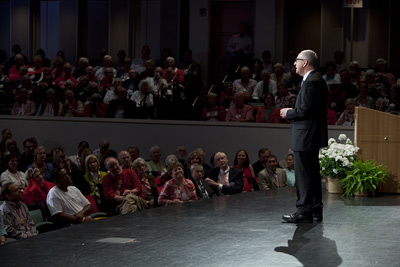All Cornellians have a stake in faculty renewal, Skorton says
By Joe Wilensky

Cornell President David Skorton lauded the university's faculty and prioritized faculty renewal as a "key area of focus" for the future in his State of the University Address June 9 during Reunion Weekend.
He first paid tribute to two Cornell presidents emeriti in attendance among the 1,100 alumni and friends in Bailey Hall -- Frank H.T. Rhodes and Hunter R. Rawlings III -- and also paused for a moment of silence to remember Dale R. Corson, Cornell president from 1969 to 1977, who died in March at age 97.
"Dale was one of Cornell's great leaders in part, I believe, because he never lost touch with his roots as a member of the faculty," Skorton said. "And the current faculty, just like those you may remember from your days on the Hill, are the heart of Cornell."
Cornell has already begun to ramp up faculty hiring to replace the estimated one-third of the university's faculty who will be retiring over the next decade, Skorton said, noting that this is one of the university's key strategic concerns, along with student access to education, public engagement and internationalization.
"We need to be creative about hanging onto our best minds as we create opportunities for their successors," he said. "This will require more bridge appointments," he said, such as hiring new Ph.D.s, rising stars and senior scholars as experienced faculty continue to be productive until they are ready to retire. During the 2011-12 academic year, 71 new tenure-track appointments were made on the Ithaca campus alone, up from just 27 in 2010-11 and 42 in 2009-10, he said.
Skorton described new initiatives, including the naming of the new humanities building to be built adjacent to Goldwin Smith Hall and the new universitywide economics department that will bring together economics faculty from the College of Arts and Sciences, labor economists from the ILR School and various senior faculty from other schools and colleges and is expected to expand research in the field and improve the student experience.
Skorton also addressed numerous ongoing challenges -- the need for space for faculty, how staff reductions made in response to the recent recession has impacted faculty support and the need for more graduate assistants. He also fielded several questions from the alumni audience, answering with candor and good humor.
"As we approach the sesquicentennial, I see Cornell continuing to lead the way across a very broad sweep of academic areas -- in the sciences, technology, professional fields, the social sciences, the arts and humanities -- and hiring the faculty members who will propel us to become, as our aspiration states, among the top 10 universities in the world," Skorton said.
He also made special mention of the developing CornellNYC Tech campus in New York City (whose first classes will begin this fall in space donated by Google) and the partnership with the Technion-Israel Institute of Technology. He praised Cornell's tech campus "dream team" of Provost Kent Fuchs, College of Engineering Dean Lance Collins, tech campus founding dean Dan Huttenlocher and tech campus vice president Cathy Dove. He also thanked Chuck Feeney '56, whose Atlantic Philanthropies made a transformative $350 million gift in December to pay for the entire first phase of the tech campus.
It is faculty members, Skorton stressed, who continue to deepen Cornell's commitment to education.
"... all of you have been the beneficiaries of great undergraduate teachers," he said, "and all of us have a stake in building the faculty that will define Cornell's future in undergraduate education. "You are all Cornellians," Skorton said. "Then and now and forever. Thank you for sharing this journey with me."
The new humanities building that will be constructed adjacent to Goldwin Smith Hall along East Avenue will be named Klarman Hall, in recognition of the efforts of Seth '79 and Beth Klarman to enhance the humanities at Cornell, President David Skorton announced June 9 during his State of the University Address.
Groundbreaking for Klarman Hall is scheduled for 2013, with completed construction expected by December 2015. The building will provide 33,250 square feet of programmable space for the humanities in the College of Arts and Sciences. The design phase of the building was relaunched in January once construction costs had been fully funded through philanthropy.
Skorton also thanked Dick Groos '52, who was on campus to celebrate his 60th reunion and who, with his family, made a gift to name what will be Klarman Hall's "beautiful, capacious" atrium that will connect with Goldwin Smith Hall.
Skorton noted that of the 56 College of Arts and Sciences faculty members hired over the last two years, 34 -- almost two-thirds -- are humanists. It is faculty in the humanities, he said, who will continue to provide students across the university "opportunities to develop as scholars and critical thinkers."
Get Cornell news delivered right to your inbox.
Subscribe